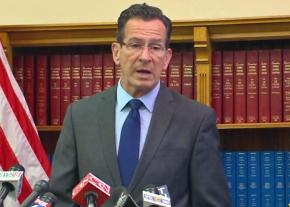Tax the rich to save Connecticut schools
Teacher writes on the public schools crisis and the untried solution.
WHY ARE Connecticut's public schools facing severe cuts? The answer to this question is simple: Democratic Gov. Dannel Malloy will not institute tax increases on the super-wealthy.
The current budget crisis is yet another example of intentionally creating a scenario of false scarcity in order to impose austerity on middle-income and working-class people in Connecticut.
According to the Atlantic: "The richest 0.02 percent of Connecticut households make more money than the bottom 48 percent...This 0.02 percent clusters along the Gold Coast and tends to work in finance." These are the households that benefited from free cash handouts that came in the form of massive bailouts during the 2008 crisis.
Unable to reach a budget proposal agreement with the state legislature at the end of June, Malloy has proposed a budget that would kill public education in Connecticut. State funding for schools in many districts represents roughly half of district budgets--the other half is derived from the municipal tax base. Under Malloy's plan, state education funding would be cut in almost every district by massive amounts, ranging from 30 to 100 percent.

The plan would spare urban districts like Hartford, New Haven, and New London this year. However, working-class and middle-income suburban and rural districts would be devastated.
For example, the district in which I teach is in the bottom 10 percent of Connecticut schools in ability to fund a budget with municipal taxes. If Malloy's plan goes through in October, my school district is looking at a 40 percent cut--from $10.7 million in state funding to $6.4 million.
We aren't talking about layoffs to make up this difference, but the elimination of public education in towns throughout our state.
IT BEARS repeating: 0.02 percent of Connecticut households have an annual income equal to the bottom 48 percent. That is a large chunk of cash in the hands of a few. Instituting tax increases now on the super rich, closing loopholes and keeping those increases in place would give us the necessary funds for education and social services.
Those who talk of "fiscal crisis" are always looking at the future with the current tax system in mind. We need to look to the future, too, and advocate a system that works for working people and doesn't kill them with cuts in services and regressive tax measures, but shifts the burden to the rich--which is no real burden to them.
There is a way out, but it won't happen if we don't demand it.
Our current tax system punishes working-class people. Personal income taxes make up a larger share of tax revenue relative to corporate taxes. In the 2016 fiscal year, personal income taxes represented 52 percent of the $17.78 billion collected in taxes; corporate taxes only represent 4.95 percent of the total.
Personal income taxes in the state have six brackets, starting at 3 percent and stopping at 6.99 percent. Because there is relatively little difference among them, these taxes are a bigger burden on working people than the rich, who can much more easily afford the top bracket, even if they don't have tax attorneys to spare them paying anything.
Some think Malloy's budget proposal is an alarmist maneuver of "playing chicken" to cajole the Connecticut state legislature into passing a budget. However, even if funding is restored in the education budget, it is clear that Malloy has his eyes set on going after teachers.
The Connecticut teachers' retirement fund, which all Connecticut public school teachers pay into, has been underfunded for years--decades before Malloy took office. Now, Malloy wants to shift the funding of pensions from the state to towns. This will devastate already stretched budgets.
This is nothing but a cynical ploy to pit middle-income and working-class residents against the teachers who work in their towns. It is another regressive tax shifted onto working people.
Instead of instituting tax policies that would easily solve the budget "crises," Malloy is accelerating the impoverishment of Connecticut's working class, which includes teachers. Taxing the rich is the only solution.


